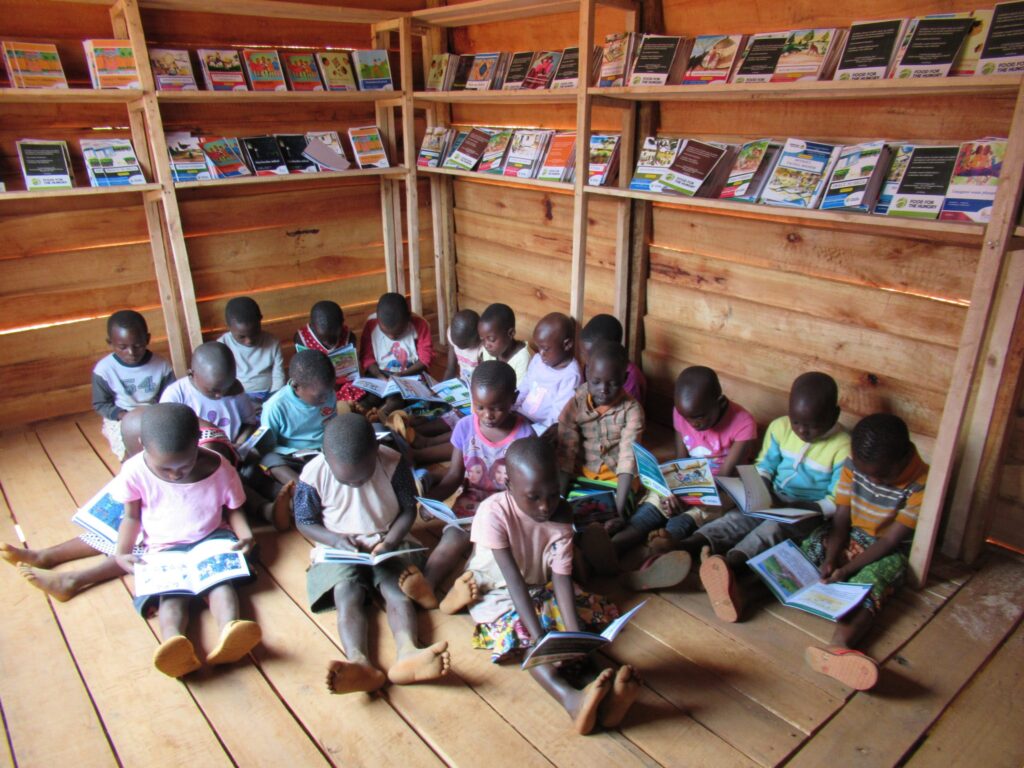An important part of fulfilling the mission of Food for the Hungry (FH) – “All forms of human poverty ended worldwide” – is to tackle the hunger of the mind. In communities we serve, the lack of reading materials is often more acute than the lack of food. How will children learn to read and become proficient readers if there are no books?
The next time you hold a children’s book in your hands, consider: Someone who loves children and cares about their development intentionally created it for developing readers. At FH, we strive to create reading materials that will be suitable to the culture, context, and learning environment where early readers are growing and developing.
Filling the Global Book Gap
I asked my supervisor, based in Washington, D.C., how many children’s books are available in the U.S.
“I had access to lots of books when I was a kid,” she replied. “Bookcases were full of them in my home, and more could be borrowed at the local library where there were thousands of selections.”
Clearly, access to children’s books is far easier in the developed world. There are far too few books available in many of the underserved languages that children speak and understand around the globe. This is referred to as the Global Book Gap.
FH Burundi engaged a university language professor to learn how much children’s reading material exists in Burundi. Not surprisingly, very little was found apart from the few stories contained in textbooks.
Writing for children can be easy and fun, but this lack of children’s reading material will persist if no one chooses to do something. So, let it be us!

Where Do We Start?
In February 2022, FH Burundi gathered 15 language graduates and five illustrators to write reading material for children. But how do you become a writer overnight? We started with proper preparation at three levels:
1) With the help of a university literacy professor, FH Burundi conducted documentary and thematic research. This was important to determine what we should write about, based on what is already available. From this analysis, 13 themes were identified from the local context to guide the writers.
2) Technical preparation was necessary. Participants were trained to write for children and identify characteristics of a story that will captivate their attention. Participants in the 10-day workshop also learned about the parts to include in a story for children. They were also trained to use book-writing software.
3) Next, participants attended practicum sessions, where they created stories and received feedback from the facilitator.
A New Livelihood that Helps Others
Creating children’s reading materials can be fun. Although the stories are short, they help children enjoy and develop an early interest in reading. By involving graduate students in the story-writing exercise, FH Burundi hopes to develop new creators of children’s stories. This could provide them a rewarding vocation and livelihood as they help children in their country.

“Apart from classroom assignments, I had never tried writing,” said Ines Arakaza, a graduate in the Swahili department. “At the beginning the facilitator asked, ‘Do you consider yourself a writer?’ This question did not make sense to me. But now I dream of becoming a writer. I am a writer,” she added, laughing.
It was encouraging to see what flowed from the pens of these inexperienced graduates. By the end of the workshop, 56 storybooks were created for specific reading levels! As we read the stories created, we fell in love with these works of art. Thousands of children in Burundi will read and enjoy them for generations to come.
These reading materials will be available in small community libraries and in local schools in Burundi. Children will have easy access to borrow and read them from these locations very close to their homes.
It is good to know that there are people who love and care for children in Burundi. Like the young boy’s fish in the Bible, their small seed placed in the hands of God bears fruit that will feed thousands of children.
Joseph Ntakirutimana is FH’s Africa Regional Technical Advisor in Education.
For Further Reading:
Download a sample of one of the new Burundi children’s books
Let’s Learn to Read Benefits Burundi Students



